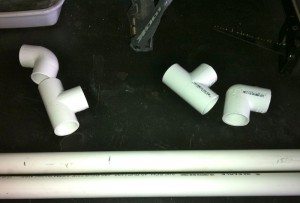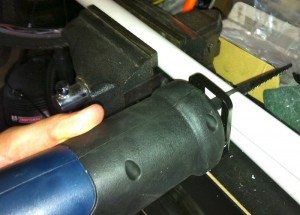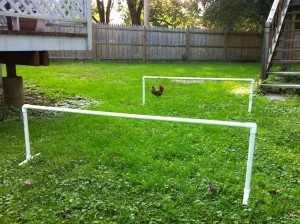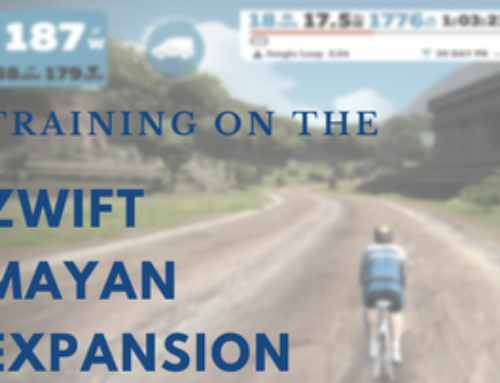 With the turning of the calendar into September, the road race season is winding down and the cyclocross season is revving up. For those not in the know, a brief description would read like this: Cyclocross: A bunch of road racers on modified road bikes (bikes with big tires and cantilever brakes) racing on a closed, obstacle filled course in mud, rain, snow and every other element. Suffice to say, a cyclocross bike is a pretty specific piece of equipment (which I'll cover in a future post), and cyclocross itself requires a specific set of skills, most notably the ability to clear obstacles on the race course. Finding those obstacles around your local dirt roads can be a challenge though, so you're best bet is to make a few of your own to practice with. Reading on will show you just how simple (and cheap) it can be to make effective, durable barriers that you can take with you to any park or field and practice your skills.
With the turning of the calendar into September, the road race season is winding down and the cyclocross season is revving up. For those not in the know, a brief description would read like this: Cyclocross: A bunch of road racers on modified road bikes (bikes with big tires and cantilever brakes) racing on a closed, obstacle filled course in mud, rain, snow and every other element. Suffice to say, a cyclocross bike is a pretty specific piece of equipment (which I'll cover in a future post), and cyclocross itself requires a specific set of skills, most notably the ability to clear obstacles on the race course. Finding those obstacles around your local dirt roads can be a challenge though, so you're best bet is to make a few of your own to practice with. Reading on will show you just how simple (and cheap) it can be to make effective, durable barriers that you can take with you to any park or field and practice your skills.
 Ten bucks and ten minutes
Ten bucks and ten minutes
That's really all you need to spend in order to have a pair of durable barriers for practice. In this case, I'm showing you how to make a single barrier. Simply double everything in order to make a second one.
What you'll need is a short trip away at your local hardware store. You'll need an 8 foot piece of 3/4″ PVC pipe (schedule 40 happened to be very cheap), two 3/4″ tees, and two 3/4″ elbows. (All told, those five items cost about $3.65 at the local Home Depot.) You'll also need something to cut that PVC pipe with. You can use anything from a hand saw to an angle grinder (I used a reciprocating saw) or if you really have no tools at home, you may be able to beg the hardware store to cut the pipe down for you.
 Measure twice, cut once
Measure twice, cut once
In terms of making cuts, you'll want to cut that 8′ piece into two 4′ sections. Set one 4′ section aside to become the cross bar of the barrier. You'll need to mark and cut the other 4′ section into four 4″ pieces and two 15″ pieces. The 4″ pieces will be used to make “feet” that will keep the barrier upright in the grass, and the 15″ pieces will make up the “legs” that will hold the cross bar. While 15″ seems high, bear in mind that UCI rules state that barriers can be no more than 40cm in height (these actually end up being right around 40cm with 15″ legs.)
 Hacking up the 4′ section into the requisite parts shouldn't take more than a few minutes at most, and power tools make extremely quick work of PVC. Just be sure to exercise caution in the form of utilizing a vise to hold the pipe and wearing shop glasses to protect your eyes from flying shrapnel (not that there should be much more than a few plastic shavings, but better safe than sorry.)
Hacking up the 4′ section into the requisite parts shouldn't take more than a few minutes at most, and power tools make extremely quick work of PVC. Just be sure to exercise caution in the form of utilizing a vise to hold the pipe and wearing shop glasses to protect your eyes from flying shrapnel (not that there should be much more than a few plastic shavings, but better safe than sorry.)
 Putting the pieces together
Putting the pieces together
With all your cuts made, it's time to start putting this little jigsaw puzzle together. The beauty of these kinds of barriers is that they are easily assembled and don't require any glue, nails, screws, pins, etc etc. You simply have to push the pieces together snugly, line them up and start practicing.
 So let's get to it. Slide a 90 degree elbow onto the end of each 15″ leg. Push the Tee fitting onto the other end with the straight portion of the tee perpendicular to the leg. Once you've got the legs put together, slide each of the 4″ pieces into the ends of the tee fitting, and your legs and feet are fully assembled (as shown in the picture.) To finish the job, push the other end of the elbow onto either end of the cross bar piece we set aside earlier, align everything so it stands up straight and set it out to practice with.
So let's get to it. Slide a 90 degree elbow onto the end of each 15″ leg. Push the Tee fitting onto the other end with the straight portion of the tee perpendicular to the leg. Once you've got the legs put together, slide each of the 4″ pieces into the ends of the tee fitting, and your legs and feet are fully assembled (as shown in the picture.) To finish the job, push the other end of the elbow onto either end of the cross bar piece we set aside earlier, align everything so it stands up straight and set it out to practice with.
 Easy come, easy go
Easy come, easy go
Not only are these PVC barriers cheap to assemble, they are lightning fast to tear down and easy to transport. If you're planning to meet a few other people at the local park for some ‘cross practice, it only takes 30 seconds to tear down two barrier, toss them in the car and bring them along. The PVC construction is light and durable, able to withstand people tripping on it, and it won't cause them to faceplant into your yard, due to the short feet allowing it to just fall over when hit.
While cyclocross may be a very specialized kind of bike racing, a few dollars and some practice will help to allay your fears some race day.






[…] of our pipe art? Check out Rob’s post on building your own cross […]